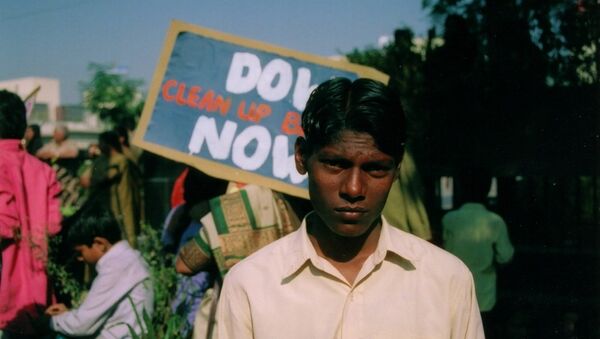A leak at the plant released at least 30 tons of highly-toxic chemicals, including methyl isocyanate, which is extremely toxic to humans. Because the toxic cloud was heavier than air, it crept along the ground as it escaped the plant, which was surrounded by shanty towns. More than 600,000 people were in the path of the deadly plume. It caused the throats and eyes of the victims to burn; induced severe nausea, and ultimately, death.
Estimates of the death toll from the disaster vary from 3,800 to as many as 16,000. Estimates recently released by the Indian government point to 15,000 deaths in the 30 years since the accident. But the fallout reaches far beyond those who were killed. Thousands of people were seriously injured and many more suffer from chronic illnesses, including thousands of physically and mentally disabled children.

“I still feel the pain even today, I still see those images,” Mohammed Ismail, a victim of the accident, whose daughter was blinded by the gas cloud, told ABC News. “On every gas anniversary, I feel it would have been better for me to die that night.”
In the decades since the accident occurred, survivors of that terrible night have been fighting to have the site of the leak cleaned up. They say progress slowed considerably since 2001, when Union Carbide was taken over by Dow Chemical. Human rights groups say there are still thousands of tons of toxic waste buried underneath the site, which may never be decontaminated.
One of the most contentious issues since the accident is the question of compensation for the victims. At the end of the 1980s, as a result of a court settlement, Union Carbide paid out $470 million — only 14% of the claim that was demanded by rights groups. They were looking for a settlement of $8 billion. What was actually received works out to less than a thousand dollars per victim.

The legacy of the Bhopal disaster lives on. The earth and water surrounding the accident site are still badly contaminated.
In the 1990s, however, the government of India took control of the ruined site. This move allowed the former owners of the plant to excuse themselves from any ongoing liability.
With new leadership in India under Narendra Modi, will there be any progress going forward? The director of Amnesty International, Salil Shetty, is unconvinced.
“In September, Modi and Obama made a joint statement saying the ties between the US and India are rooted in their shared desire for justice and equality,” he said. “It is neither justice nor equality when a US company can evade accountability for the deaths of thousands of people in India.”




